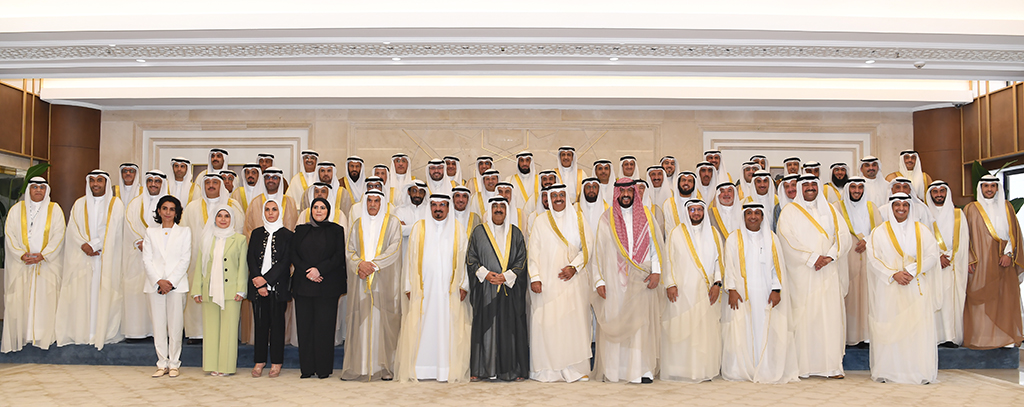By B Izzak
KUWAIT: It was an inauguration like no other. HH the Deputy Amir and Crown Prince Sheikh Mishal Al-Ahmad Al-Sabah gave yet another historic address at the opening session of the National Assembly, as he passionately called for cooperation, end to disputes and development, to thunderous applause from the jam-packed chamber and gallery.
Later, HH Sheikh Mishal turned the official ceremony into an almost informal event as he shook hands with lawmakers, exchanged traditional greetings and chatted with all MPs, sometimes at length. He appeared very relaxed, perhaps reflecting an atmosphere of optimism that the election was smooth and the outcome was as expected.
But that followed a hard-hitting address by HH the Deputy Amir and Crown Prince, reading it on behalf of HH the Amir Sheikh Nawaf Al-Ahmad Al-Jaber Al-Sabah. “If the (Amiri) address on June 22 was the speech of the new era, today’s speech is the address for the covenant of the new era,” he said, in reference to Kuwait’s national covenant issued 60 years ago that put the country on the democratic path.
HH Sheikh Mishal described the day as a “remarkable and glorious day”, and called on both the government and MPs to cooperate and focus on achievement rather than engaging in disputes. He urged MPs to practice clean democracy, end rows and focus on the supervision and legislative role of the Assembly to enact laws that strengthen national unity and achieve the ambitions of the people.
HH the Deputy Amir and Crown Prince issued a firm warning to legislators by asking them to rearrange their priorities, which should not start with the files of those who broke the law. MPs have said they are planning to start the functions of the new Assembly by submitting a general law to pardon all political prisoners.
HH Sheikh Mishal also reminded the lawmakers that they should respect the authorities of HH the Amir and not to cast any doubt towards them, as “we will not allow this to happen”. He urged the government to work out a strategic plan and improve work at ministries.
In an unprecedented move, Cabinet members walked out of the chamber as MPs began procedures to elect the speaker, his deputy and other posts, in fulfilment of a pledge by HH the Amir that the government will not interfere in the internal elections of the Assembly. MP Ahmad Al-Saadoun was elected as a speaker of the National Assembly, and warmly congratulated by HH the Prime Minister Sheikh Ahmad Al-Nawaf Al-Sabah, his deputy, Interior Minister Sheikh Talal Al-Khaled Al-Sabah, and other lawmakers. MP Mohammad Al-Mutair was elected deputy speaker. MPs Osama Al-Shaheen and Abdulkarim Al-Kandari were elected secretary and observer of the Assembly respectively.
But former speaker Marzouq Al-Ghanem said on Twitter that there was a procedural error in the election of the secretary and observer. He said according to the internal charter, the election of the two posts requires an absolute majority of the house membership and not just the majority of those present. He advised the Assembly to rectify the mistake before adjourning the session.
Before that, the prime minister said as the country enters a new era full of optimism and hope, it requires a new vision for national action based on reforms and away from disputes. The premier called for national unity and cooperation with the Assembly based on the principles of the constitution. He also stressed on the need to upgrade education, health and housing welfare. Sheikh Ahmad also said his government’s program will focus on diversifying non-oil revenues, restructuring the public sector, fighting corruption and draining the sources of money laundering.
MP Marzouq Al-Hubaini, the oldest member who chaired the first part of the session, said the Amiri address on June 22 was a roadmap for exiting the political deadlock, but insisted that Kuwait badly needs political stability. He expressed hope that the Assembly will correct the course of the past, adding that cooperation with the government is the only way to achieve national goals. Hubaini said that fighting corruption has become an urgent necessity. He also stressed on the need for reforming laws that restrict public freedoms and amending legislation that governs the judiciary. Following the election of the speaker, his deputy and others, the Assembly for the first time ever elected all committees unanimously and without voting.











